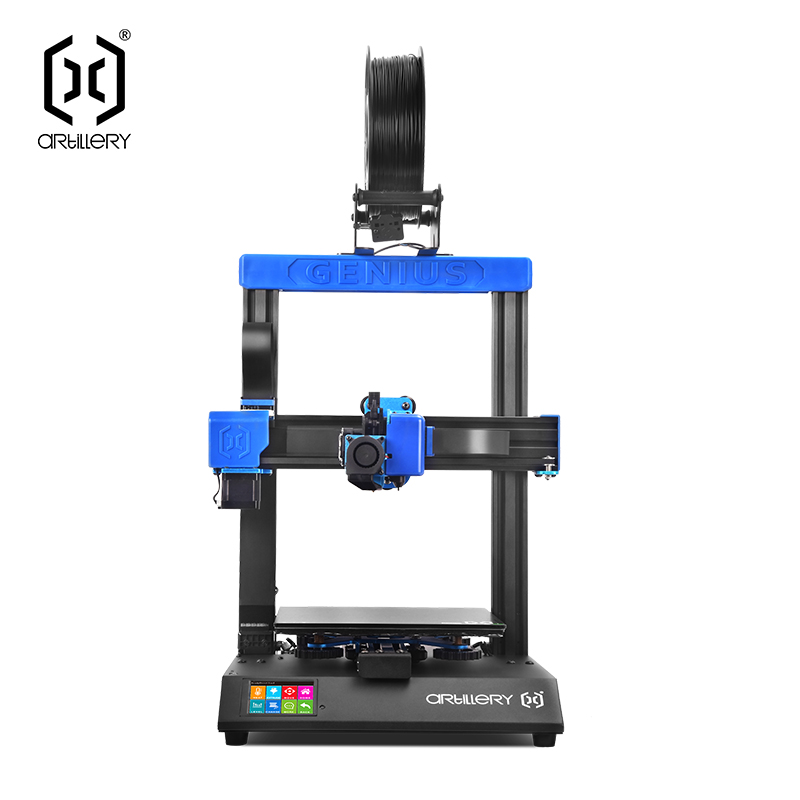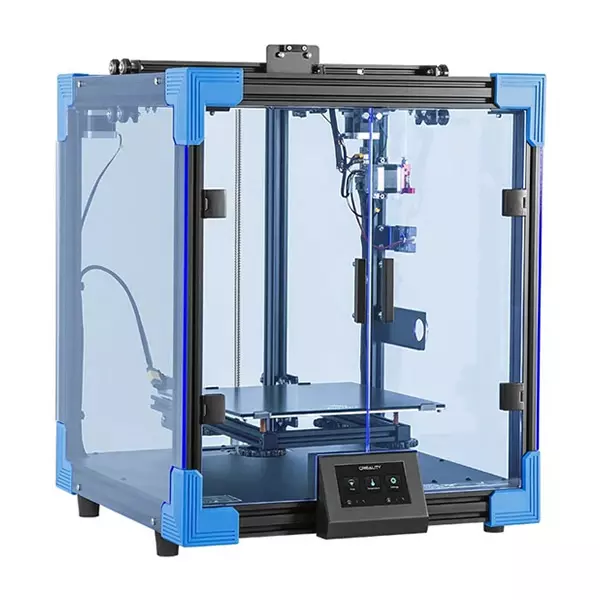Compare Genius Pro vs Ender 6
Comparison between the best 3D printers
Choose the best 3D printer at the best price. The cheapest 3D printers are here.
Buy a 3D printer here with 3D Fila.
 |
 |
|
| Model | Genius Pro[BUY Genius Pro] |
Ender 6[BUY Ender 6] |
| Printing Material | Filament | Filament |
| Buy Filament for Artillery Genius Pro | Buy Filament forCreality 3D Ender 6 | |
| Estimated price | $309,00 | $499,00 |
| Manufacturer | Artillery | Creality 3D |
| Release Year | 2022 | 2020 |
| Print Volume [mm] | 220x220x250 | 250x250x400 |
| Printer Size [mm] | 430x390x590 | 495x495x650 |
| Weight [kg] | 9,6 | 22 |
| Power Loss Recovery | YES | YES |
| Enclosed printer | NO | YES |
| Bed Leveling | Automatic | Manual |
| Filament End Sensor | YES | YES |
| Bed type | Heated | Heated |
| Power supply system | Direct Drive | Bowden |
| Standard nozzle | 0,4 | 0,4 |
| Maximum Nozzle Temperature [°C] | 240 | 260 |
| Maximum Bed Temperature [°C] | 120 | 100 |
| Maximum printing speed [mm/s] | 150 | 150 |
| Filament holder | YES | YES |
| Camera for supervision | NO | NO |
| Recommended filaments | PLA, PETG, Tritan, Flex, ABS | PLA, TPU, ABS, PETG |
| Recommended slicers | Cura, Simplify, Slic3r, IdeaMaker | Cura, Simplify, Slic3r |
| Maximum Resolution [mm] | 0,1 | 0,1 |
| Processor | Ruby 32bit | 32 bits |
| Display | Touchscreen TFT 3,5'' | Touchscreen TFT 4,3'' |
| Power Supply | 24V / 504W | |
| Connectivity | SD / USB | SD / USB |
| Operating systems | Windows, Mac, Linux | Windows, Mac, Linux |
| Date of registration in the system | 2022-11-07 | 2021-04-15 |
| Release date | 2022 | 2020 |
| Extra features | The Artillery Genius Pro is a standout 3D printer with a fast-heating AC tempered glass print bed and a sleek design with a black aluminum base and blue accents. It features a Titan-style direct extruder and a 32-bit Ruby mainboard. Despite its advanced feature set, it struggles to maintain print quality, requiring frequent adjustments and calibrations, and its glued glass bed makes cleaning and replacement difficult. | The Creality Ender 6 stands out in the world of 3D printers with its CoreXY system, offering fast and high-quality prints. With a robust design, it has acrylic panels to protect against air currents, optimizing the printing of materials that require higher temperatures. It features a generic Creality hotend, effective up to ~240°C. Its differentials include 10mm GATES belts, promoting stability at high speeds, and a 360W power supply for reliable performance. The machine also has an intuitive user interface through a 4.3-inch touchscreen. |
| Support for multiple colors and materials (AMS and CFS) | NO | NO |
Notes * |
||
| Cost-benefit | 7 / 10 | 7 / 10 |
| Hardware | 2.4 / 10 | 2.5 / 10 |
| Tela | . | . |
| Print volume | 3 / 10 | 4 / 10 |
| Performance | 1 / 10 | 1 / 10 |
| [BUY Genius Pro] | [BUY Ender 6] |
Conclusion |
| In comparing the Artillery Genius Pro and the Creality Ender 6, both printers offer unique features that cater to different user needs and preferences. The Genius Pro, being the more economical option, excels in its fast-heating AC tempered glass bed and a compact design, making it suitable for users with limited space or those seeking a budget-friendly solution. However, it does face challenges in maintaining print quality, requiring frequent adjustments, and its glued glass bed can complicate maintenance. On the other hand, the Ender 6, with its larger print volume and robust CoreXY design, is positioned as a more professional-grade printer. Its enclosed structure aids in minimizing temperature fluctuations during print jobs, thereby enhancing material stability, particularly for high-temperature prints. Despite being at a higher price point, the Ender 6 boasts superior stability and the quality of prints, which may justify the investment for those pursuing consistent and detailed 3D prints. Overall, the choice between the two printers depends on individual priorities — if cost and compactness take precedence, the Genius Pro is a solid choice. However, if print quality, stability, and larger volume are more critical, the Ender 6 is the better investment, despite the higher price. In conclusion, both printers present viable options depending on user requirements, with a balanced consideration between features, performance, and cost. |

